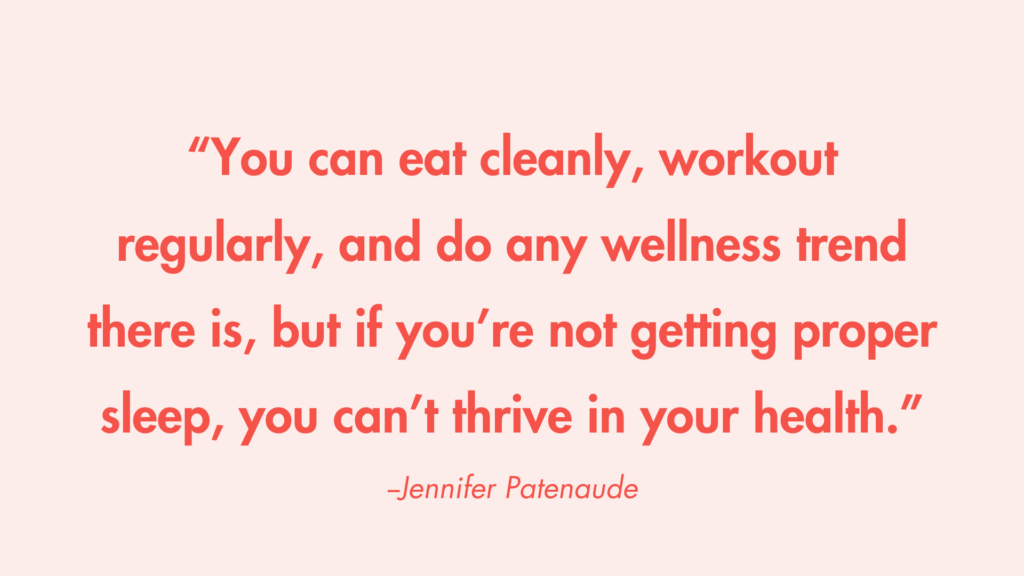Sleep Strategies for Women with Chronic Conditions
January 9, 2025
Written by Jennifer Patenaude, Sleep and Wellness Advocate and the Founder of Jennifer Eve Wellness
Sleep is crucial to our livelihood, our businesses, and our earning potential. It’s also important for our relationships. Really, it touches every facet of our lives. In this article, you’ll learn a few key strategies to improving your sleep so you can improve your overall health.
Most importantly, quality sleep is the foundation of health. You can eat cleanly, workout regularly, and do any wellness trend there is, but if you’re not getting proper sleep, you can’t thrive in your health.
By improving your sleep, you can go from:
- Brain fog and exhaustion to focus and productivity
- Struggling through the day to running your business efficiently
- Making poor decisions to positively impacting those around you
Keep reading to find out why sleep is so important and how you can optimize your sleep so you can thrive in your health and your career as a Chronic Boss.
The Impact of Sleep on Health
Even if you struggle with sleep due to chronic conditions or medications, small, incremental improvements can make a significant difference.
Take weight loss, for example. Without sleep, the human body will not release fat, and the hormones that regulate our appetite and eating are affected. Ghrelin, the hormone that produces hunger, goes up, and Leptin, which creates a “full” feeling, takes a dive, so you end up feeling hungrier more often and eat more calories. If weight loss is your goal, getting adequate amounts of quality sleep plays a huge role.
Sleep impacts our brain’s lymphatic system, called the glymphatic system, helping to flush out toxins that build up during the day. It also affects our testosterone levels. Men aren’t the only ones who need testosterone; it’s critical for our focus and drive. In addition, sleep impacts our mental health and brain function. It truly is the foundation of health.

Optimize Your Sleep with Sleep Strategies
We can break down strategies to optimize sleep into three categories: sleep environment, sleep routine, and sleep story.
Sleep Environment
The environment around you when you sleep is the most obvious place to start.
Ideally, we want to sleep in a room that is as dark as possible. Melatonin, the hormone that supports sleep, can be impacted by even a small light source, so make sure to reduce any light sources coming from outside or lights from things like a cable box. Turn the light away from you, put a piece of tape over it, or make sure it is red or amber-tinted light.
We can also improve our sleep environment by setting the temperature to 64-68 degrees because our bodies’ natural core temperature dips at night. In addition, avoid screens before bed, make sure you’re using a comfortable and inviting mattress and pillow, and keep the room as quiet as possible while sleeping. All of these things in your environment will help improve your sleep quality.
Sleep Routine
Next, let’s talk about some of the lesser-known elements that play a big role in sleep quality, starting with sleep routine. Our bodies love routines, and having a consistent routine goes a long way in helping us sleep.
Your sleep routine starts as soon as you wake up in the morning. There’s a saying: ‘How well we rise is how well we rest.’ Ideally, we should have a gradual increase in cortisol in the morning to give us that alert and awake feeling. The best thing to do first thing in the morning is to go outside in natural light within 10 minutes of waking up because exposure to natural light starts the body’s clock and cortisol production. If you wake up and pick up your phone first thing, that’s going to spike your cortisol, which is not a good way to wake up.
We can also use sunlight to keep our energy levels up throughout the day. You may find that you experience a dip in energy in the afternoon, and instead of reaching for a caffeinated drink or a sugary treat, try going outside for a few minutes instead.
Another facet of a good sleep routine is maintaining a consistent bedtime and wake time, otherwise known as sleep regularity. Research suggests that sleep regularity is critically important for our long-term health, as is sleep duration or the number of hours we sleep a night. But while aiming for seven to nine hours a night is the standard recommendation, it’s the consistent timing of those hours that may have an even greater impact.
Sleep Story
We all have stories we tell ourselves, thoughts that run through our heads about every part of our lives. The same is true with our health. Mindset is hugely important, and it absolutely affects our sleep.
If you’ve ever said things like “I’m a terrible sleeper” or “I can never get more than 6 hours of sleep a night,” physiologically, our cells respond to our thoughts as though they are reality. If you keep playing those stories in your head, that’s your reality.
The good news is that stories can be rewritten. One tip to rewrite those stories: when you’re lying in bed, right before you fall asleep, repeat positive “I am” statements in your head or out loud. For instance: “I am safe and comfortable in my bed,” or “I am thankful for the 8 hours of sleep I am about to get.” By repeating these statements, that is what your subconscious is going to start to believe.
We are the captains of our health journey. Take charge of your well-being by taking small steps to improve your sleep using these strategies. By prioritizing your sleep, you will enhance your overall health and productivity.
Do you want to learn more about how you can improve your sleep quality for better health and career performance? Grab your free copy of “Rest & Recharge: A Tailored Approach to Better Sleep” from Jennifer Eve Wellness.

Jennifer Patenaude is a Sleep and Wellness Advocate and the Founder of Jennifer Eve Wellness. With a passion for guiding entrepreneurs and busy executives to their best selves, she specializes in transforming sleep from a mere afterthought to the cornerstone of peak performance and wellness.
